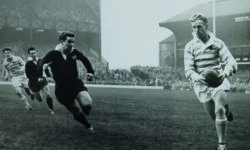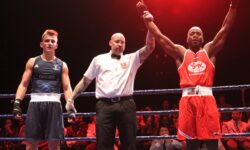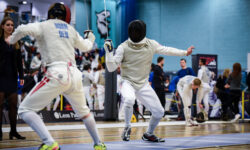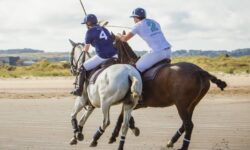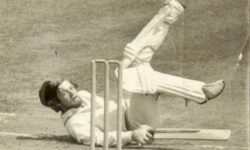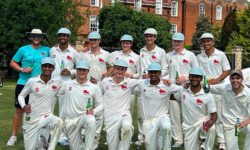The final had seen Kenny on the brink of disqualification for overtaking the pace-setting derny, but culminated in his sixth Olympic gold medal, as he joined Sir Chris Hoy as Great Britain’s most decorated Olympian.
Far from the heat and tension of the velodrome, it was an altogether quieter affair when the Farnworth born athlete fielded questions from an enthusiastic audience at Trinity Hall College on Friday evening.
Kenny, who also holds an Olympic silver to complement his six golds, began by describing his progression through the ranks of British cycling. The 28-year-old, who came across as extremely modest throughout the event, claimed he was “extremely fortunate” to make it to the elite level.
“The perfect steps just appeared in front of me,” he reflected. “The ‘Talent Team’ was created to test us at an early stage, then the Olympic Development Programme was introduced…I wouldn’t have done it [progressed so far in cycling] without those steps.”
Cycling has always been at the heart of Kenny’s life. Growing up in the vicinity of, at that stage, the UK’s only velodrome, he was able to compete on the track at a relatively young age. By 2007, he had already featured at the World Cup Classics, enabling him to compete against some of the best riders and sprinters in the sport.
Such experience and exposure have proved invaluable, with Kenny also stressing the importance of racing for enjoyment at that time, growing his love for cycling.
“I actually didn’t win a race until I was sixteen,” said the man who had achieved 20 Junior and Senior medals on the track by 2013.
“It didn’t matter what we were racing for, whether it was tenth or first, what mattered was enjoying cycling.”
Such reflections understate, of course, the competitive nature of Kenny. His career thus-far has proven him to be a winner and his target at Rio this year was nothing other than securing gold.
His historic third medal was, however, thrown into jeopardy in the Keirin Final, after an anxious wait to see whether Kenny had passed the derny illegally, rendering him liable to disqualification. Footage provided by Will Forbes, a performance analyst with British Cycling, eventually helped Kenny to stay in the race.
Kenny looked back on the incident with a wry smile, conceding that “not a lot” was passing through his mind whilst awaiting the official verdict.
“I didn’t think I had done anything wrong, but looking at the clips I thought I might have been relegated.
“It would just have been one of those things,” Kenny continued, “I wouldn’t have regretted anything if it had happened. I had two golds already so those would have softened the blow!”
In winning that race, Kenny took the combined haul of golds between himself and wife Laura Trott into double figures. The pair was portrayed by the media as a ‘golden couple’ during the games, but Kenny was reluctant to say which of them was more competitive.
In a previous, light-hearted interview with The Times Magazine, Kenny admitted that Trott would occasionally cheat at board games, whilst she claimed he had stormed out of a game of dominoes after failing to win.
Either way, there is no sense that Kenny or Trott try to emulate each other, rather are supportive of their dual success on the track. As Kenny concluded, “I wouldn’t be much good at the Women’s Omnium anyway,” drawing the biggest laugh of the evening from the 150-strong crowd.
Indeed, Kenny believes that both his and Trott’s triumphs have been aided by the strength of support they have received from British Cycling.
“The team looks at everything and simply says ‘How can we make that better?’
“Money is invested into the right areas and training sessions are tightly focused, with everyone having a specific goal.”
Lottery funding has also been crucial, something recognised by Kenny and Tony Purnell, the Head of Technical Development at British Cycling.
“It’s been a big, big factor. If you can dedicate all finance and human effort towards a single objective, it helps massively. That all stems from the lottery.”
The structure of British Cycling was also praised, especially for its ability to give younger riders a chance early on, such that they are not overawed when stepping up to the elite level.
“The British set-up is structured so everyone is really well drilled from an early stage,” said Kenny.
“There is no such thing as gaining experience [at the top] because everyone is ready when they step up to A team racing. The techniques you learn at fourteen or fifteen are the same as in the Olympic Final.”
For Kenny, who this month launched his book The Inside Track, alongside Trott, the future remains unclear. He has time on his side but has not made any decisions regarding competing in Tokyo, although an appearance in Japan does seem likely.
After his career in cycling, Kenny also stressed his desire to stay in the sport, using his experience to help the next generation of British cyclists.
At 28, he still has plenty to offer, though and will be hoping to surpass Sir Chris Hoy to become Great Britain’s most decorated Olympian.
